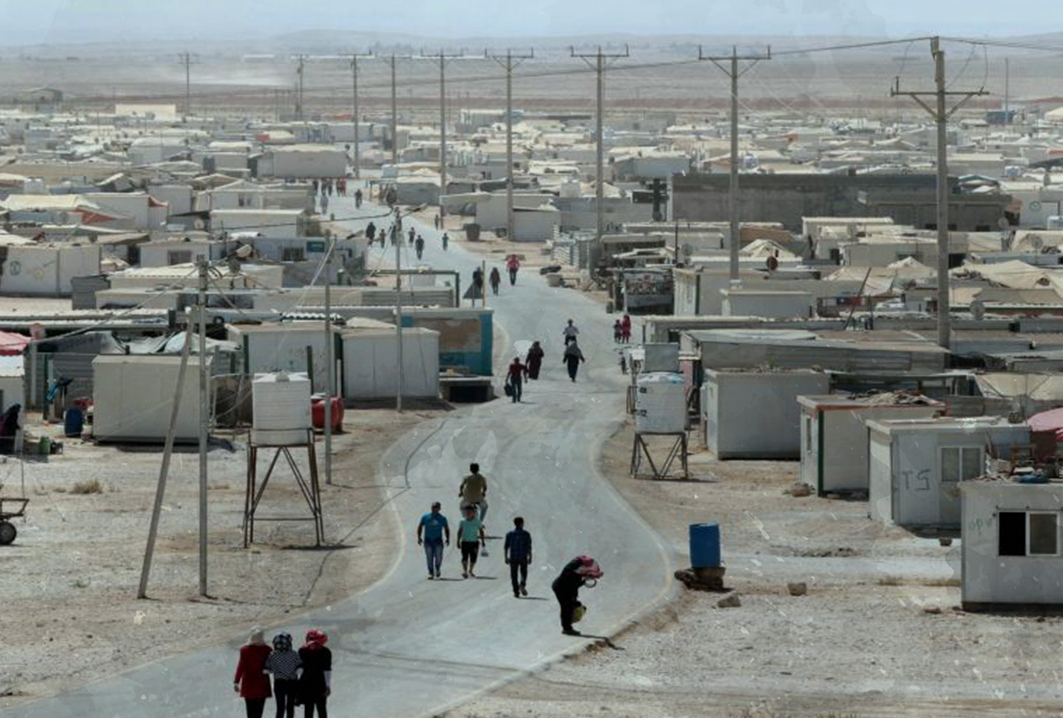April 26, 2020
Quarantine and social isolation, muzzles and sterilization materials are the essential basic procedures used to confront Coronavirus worldwide. They are accessible to many but unfortunately these two conditions do not apply to most Syrians in refugee camps outside Syria.
The Syrian refugee camps are a fertile environment for the spread of the Covid-19 – in case it spreads. It is one of the most densely populated areas where the number of residents per square kilometer ranges between 60 to 70 thousand people, each tent houses between 6 to 12 people.
Maryam is an agricultural engineer who lives in the Zaatari camp, where 120 thousand people live in an area not exceeding 2 km. She says: “I live with my five children and my husband’s mother in a tent that is smaller than 20 square meters, between thousands of tents crowded and attached to each other, separated only by cloth, so how we can protect ourselves ?! How do we practice social distancing and other precautionary and protective materials, knowing that we stand for hours in queue to use bathrooms and obtain water?
Today, more than 7 million Syrian refugees reside in neighboring countries, according to discretionary statistics. Most of them live in camps or in tin homes or rented apartments. It is difficult to estimate accurate numbers that determine the distribution and residence of refugees and ensure support and follow-up for health and preventive measures for them.
Besides the risk of the Covid 19 virus, several problems have arisen due to the quarantine imposed.
First: The acute shortage of food in the camps due to the organizations no longer able to work and the inability to reach places where food is sold due to the lockdown.
Second: The inability of refugees who live outside the camps – most of whom are not registered with the UNHCR – to pay their expenses due to the interruption of the labor market. This exposes them to further, serious economic challenges, including inability to pay housing dues and provide food, as well as access to necessary medical treatment for them and their families. They are also unable to secure alternative housing in the camps due to the recent overcrowding.
Syrian refugees also fear the discriminatory restrictions and procedures imposed on them. These are often more severe than those imposed on the local population and disproportionately restrict their movement and access to relief and medical support and guiding and awareness teams as well as the necessary information on precautions supposed to be taken and prevent the early detection of coronavirus.
In light of this, the Syrian civil platform warns that the pandemic severely affects refugees – increasing their suffering and reducing their ability to access services, especially those that prevent them from getting infected with Coronavirus. Hence, the Syrian civilian platform is sharing a set of recommendations with the governments of the neighboring countries of Syria to increase their effectiveness in fighting the virus, especially in refugee camps:
- Non-discrimination between refugees and the local population in the measures used in lockdowns and ensuring equal access to medical and food resources for refugees
- Facilitating the movement of international and local organizations and granting them special permits that facilitate their relief efforts for all Syrian refugees.
- Immediately reduce congestion by expanding refugee camps or establishing new ones
- Increasing the number of toilets as well as providing cleaning and disinfecting materials
- Establishing legal procedures to register all refugees with the UNHCR so they can obtain medical services and food aid
- Activating transparency mechanisms and allowing access to the required information about the conditions of refugees and monitoring their health status
The Syrian Civil Platform also appeals to the international community and its relief and medical organizations to act immediately in providing required assistance to the displaced and refugee Syrians, support the local governments and their organizations in Jordan, Lebanon, Turkey, Kurdistan, and Greece and designate a United Nations mandated follow-up and rescue team that monitors the conditions of the displaced and puts necessary measures in place to provide support and assistance for the safety of Community-based camp residents
- Allocate urgent aid for early detection devices or testing kits for Coronavirus, in addition to other precautionary medical materials
- Supporting local organizations and governments in neighboring countries from Syria and increasing the volume of aid provided
- Designate a United Nations medical team that sets responsive public policies to ensure fulfilment of basic needs of refugees as well as protecting the against Coronavirus
- Provide safety and shelter to the Syrian refugees and others on the Greek Five Islands and transfer them if necessary to protect them against increased risk of contracting the virus
- Pressing local governments in neighboring countries of Syria, including Greece, to adopt transparency in reporting and handling the situation in refugee camps, number of casualties, and the various needs of the all refugees

